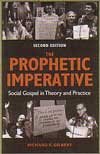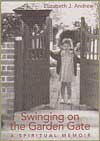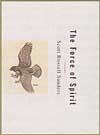| |||
| uu bookshelf |
J a n / F e b 2 0 0 1 |
||
|
Three Takes on Spirit By Rosemary Bray McNatt To serve the world or to savor it? The question, posed so elegantly in UU minister the Rev. Richard S. Gilbert's noted book of meditations In the Holy Quiet of This Hour, has been nagging the liberal religious community for decades. Some of us long for a faith that answers the Hebrew prophets' call to justice and mercy; others seek a private serenity away from life's storms. Even within a faith as free as ours, we see ourselves as pulled in one direction by our personal spiritual needs and in another by our need to make a difference in the world. This issue's books, stylistically quite different from one another, hold in common a holistic truth: we must both serve and savor life. Readers will find in them some firm foundations on which to take their stands, moments of awareness and awakening to the spirit, a few extra doses of courage, and a renewing grace. It's a special pleasure to note that all three of the books are uniquely ours: that is, published by the association's Skinner House Books or by the UUA's trade publisher, Beacon Press.  For more than 40 years, Dick Gilbert has been exploring the fault line between the self-involved and the self-giving impulses in religious life. The ideas and ideals he lays out in The Prophetic Imperative: Social Gospel in Theory and Practice (Skinner House, 2000; $18) come from his doctor of ministry thesis for Colgate-Rochester Divinity School in Rochester, NY. Gilbert earned the degree one course at a time while serving as the senior minister of the city's First Unitarian Church. For more than 40 years, Dick Gilbert has been exploring the fault line between the self-involved and the self-giving impulses in religious life. The ideas and ideals he lays out in The Prophetic Imperative: Social Gospel in Theory and Practice (Skinner House, 2000; $18) come from his doctor of ministry thesis for Colgate-Rochester Divinity School in Rochester, NY. Gilbert earned the degree one course at a time while serving as the senior minister of the city's First Unitarian Church.First published in 1980, The Prophetic Imperative has been reissued by Skinner House in a revised edition that allows the author to take into account the radical changes in public life (including the rise of the religious right) and the insights of the many liberation theologies of the 20 years since the first edition. Both then and now, Gilbert has been clear about one of Unitarian Universalism's most important tasks. "Emerson said there is 'a crack in everything God has made,'" Gilbert writes.
Neither does he shrink from identifying what he sees as one of the greatest failures of liberal religion: our unwillingness to institutionalize our desire for lasting social change. "If liberal churches can mobilize themselves only to create more and better food kitchens and do not resolutely seek out the causes of hunger in a land of plenty," Gilbert writes, "if they fill yet more Thanksgiving and Christmas baskets and do not wonder what happens to people who must eat the whole year, then I charge they are ethically irresponsible." Gilbert sets high standards for liberal religion not simply because of his own beliefs but also because of the long and impressive record Unitarian Universalism and its followers have established in the area of social change. In a short historical chapter, Gilbert examines several of our movement's leading social reformers, including Benjamin Rush, Theodore Parker, Joseph Tuckerman, Susan B. Anthony, John Haynes Holmes, and Clarence Russell Skinner. Spirituality is foundational, he argues, for the work that lies ahead, and he writes movingly about the importance of the worshiping community. "Somewhere between 'playing church with bells and smells' and a political action meeting," he explains, "is the worshiping community nourishing itself for the work of the world. At its best, worship is an expression of, but not a substitute for, social responsibility. The religious life of the community in worship overflows into public ministry." But how to organize and structure that overflow into a public ministry consistent with our faith and values? Gilbert suggests at least eight ways. A fellowship, for instance, might see itself as a community of moral discourse, one that can, in Gilbert's words, "take the normal variety of opinions on social issues and become intentional in transforming them from coffee hour chatter into moral discourse." The Prophetic Imperative contains a wealth of practical information, right down to the model the First Unitarian Church of Rochester uses to speak coherently on the social issues it cares about most. For those of us torn about a congregation's ability or even its right to speak on matters of social concern, there simply is no better place to start than this powerful little book.  At first glance, there might seem to be little connection between the broad sweep of Gilbert's book and Swinging on the Garden Gate (Skinner House Books, 2000; $14), a bisexual Christian woman's memoir about reclaiming her full identity. But the books share the call to a larger life, and both celebrate the role of spirit in moving us toward fulfillment, toward the place of radical love—of self and of others. At first glance, there might seem to be little connection between the broad sweep of Gilbert's book and Swinging on the Garden Gate (Skinner House Books, 2000; $14), a bisexual Christian woman's memoir about reclaiming her full identity. But the books share the call to a larger life, and both celebrate the role of spirit in moving us toward fulfillment, toward the place of radical love—of self and of others.In Swinging on the Garden Gate Elizabeth J. Andrew, a writing instructor and spiritual director who makes her home in Minneapolis, MN, tells the story of how she awakened to her sexuality, accepted and found an embodied God in the circumstances of her life, and connected to those touched by her self-discovery. The metaphor of her life as a garden—first dormant, then blooming, then finally, riotously alive—works because Andrew is a writer of such extraordinary power and beauty. The word luminous genuinely applies here—there is light shining out of each of the 13 essays that make up this fine book. In one breathtaking chapter, "Woman in a Wilderness," Andrew casts herself into solitude and, she hopes, a new sense of herself. She goes to Wales to study Arthurian legends and to take a month to cross the mountains by bicycle. At the very start of her journey, she is shocked by an unexpected encounter. Walking along a wooded path, coming around a turn, she sees a woman lying face down in the dust. She stops for a moment to check on the unresponsive woman, then panics and runs away, amazed by her own silence in the face of the woman's helplessness. "I did not alert professional help," she writes. "I did not put a finger to her thick white throat to find a pulse.… Touching her in that way would have meant touching my fear. Asking for help would have meant acknowledging my weakness. So I turned my back on her, on myself, just as Jesus taught us not to." Before the book ends, Andrew travels a road much longer and often rockier than her month-long bicycle trip in Wales. Her infant nephew dies; she comes out as a bisexual to her family and her church community. ("Those of us who embody ambiguity," she writes, "distribute alarm equitably in hetero- and homosexual communities alike. We can't be pinned down.") Yet a simple account of its story line could never do justice to this book's rich witness. As Andrew writes, "The story of how we are each embodied spirit is a story of liberation, radical in its theology, political in its transformative power.… Where God resides is any place that creation is at work and truth is spoken."  If an embodied God informs Elizabeth Andrew's work, the God at work in Scott Russell Sanders's new collection The Force of Spirit (Beacon Press, 2000; $22) is less intangible. "In trying to show what binds together the seeming scatter of things, I find myself pointing to an elusive energy, a shaping power that flashes forth in nature, in gesture, in human speech and action," Sanders writes. "All the names we use for the fire at the heart of matter are risky.… From all the possible names I favor spirit, because the word seems to catch the lightness, radiance, and wind-like subtlety of the power that I seek." If an embodied God informs Elizabeth Andrew's work, the God at work in Scott Russell Sanders's new collection The Force of Spirit (Beacon Press, 2000; $22) is less intangible. "In trying to show what binds together the seeming scatter of things, I find myself pointing to an elusive energy, a shaping power that flashes forth in nature, in gesture, in human speech and action," Sanders writes. "All the names we use for the fire at the heart of matter are risky.… From all the possible names I favor spirit, because the word seems to catch the lightness, radiance, and wind-like subtlety of the power that I seek."A great love undergirds the essays in this book—a love of the world as well as what might lie beyond it, a love of family and friends, and of people who farm and build, people who nourish and save the earth. Whether the essay remembers the father who died when Sanders was barely an adult or recounts an interview with Wes Jackson, the critic of industrial agriculture, Sanders is seeking out not just spirit's force but its brazen, unexpected movement across boundaries of every kind. In the essay "Wood Work," which starts with a description of Sanders's carpenter father at work and ends as a meditation on the nature of work in general, Sanders connects the notion of craft with honesty, simplicity, and excellence. What is missing from much work, he contends, is the level of meaning human beings need to thrive. "How you provide the necessities of life, for yourself and for those who depend on you, is a spiritual matter," Sanders argues. "It is as important to earn your livelihood in a worthy manner as it is to meditate or pray.… There is nothing uplifting about work if you are struggling to survive. Only when there is a margin of security and ease can you labor without fear. Only then can you freely express through work your gratitude and joy." The Force of Spirit is Scott Russell Sanders's 25th book, and what has been so striking about his work all along is its steadfast quality: the hard-won insights gained from years of careful listening and even more careful revision, the rhythms of a writing life well understood. For those who long to see the world through the lens of spirit, Scott Russell Sanders is a faithful companion. UU World magazine is the journal of the Unitarian Universalist Association 25 Beacon Street, Boston, MA 02108 · Telephone (617) 742-2100 · Fax (617) 367-3237
All material copyright © 2001, Unitarian Universalist Association. There have been accesses to this page since January 28, 2001. Address of this page: http://www.uua.org/world/2001/01/buehrens.html | |||
